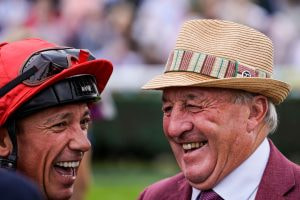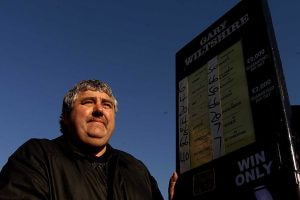Interview with Football Commentator Gary Taphouse
Gary Taphouse has commentated on more than 1,500 Premier League games since joining Sky Sports in 2005. We caught up with him to learn more about his career, which began on the rickety old gantry at Dean Court in Bournemouth back in the mid-1990s. He discusses the most memorable games he has covered, how he prepares for games, England’s chances at Euro 20204, and his thoughts on VAR.
What initially sparked your interest in this career?
It all began when I was 14 and watching the 1990 World Cup in Italy. That was the first major tournament where I tried to watch every game. I was fascinated by not just the football, but also the broadcasting side of it, and the commentary in particular. It’s the first time I actually thought, that’s a job, people actually do that for a living. I thought, I’ve got to do that, I can’t think of a better job than going to matches all around the world and describing the action.
My parents thought I was completely mad. They said, “That’s never going to happen. Start looking at proper jobs.”
What was your first role as a commentator?
I was studying at Bournemouth University, and one of the girls I lived with was going out with a cameraman from a local production company, which had the contract to film AFC Bournemouth home games. They were in League One, or Division 3 as it was known back then.
They were using the club’s vice president for commentary, and he was a bit biased, so they needed someone else. I asked if they would give me a go. They said they couldn’t pay me, but they gave me a chance to commentate on Bournemouth’s game against Bristol Rovers.
I sat on the rickety old gantry at Dean Court and commentated on the game on a microphone plugged into the side of the camera. It was basic, but I thought, this is what it’s all about! I ended up commentating on the rest of their games that season, and I presented an end-of-season VHS for the club. That went on sale at HMV in Bournemouth, and to be honest, that tape was probably more valuable than my entire journalism degree, because I left with tangible evidence that I could do this job.
How did you become a professional football commentator?
I ended up joining my local newspaper, the South London Guardian, as a news reporter. One of the first jobs that came through the fax machine – yes, I’m really old – was from a company launching Crystal Palace Radio. I went to cover the launch, and I listened to the game.
The commentator was a fan. He was enthusiastic, but he wasn’t great, so I volunteered to help. I ended up doing a couple of seasons there, and I got to know the guys at Capital Radio, who eventually gave me some paid work. I was working with Jonathan Pearce at Capital Gold, which was a dream come true, as I had been addicted to listening to the station for years. I spent a season or two commentating on Crystal Palace games, until a job came up at Chelsea. I gave up my job as a news reporter and finally had a full-time job in broadcasting. It was the start of the Abramovich years, with Jose Mourinho as manager, and I got to know the guys at Sky Sports really well. I eventually got an opportunity there after badgering them incessantly.
With EURO 2024 fast approaching, how do you rate England’s chances this year?
The odd thing about doing this job is that you’re usually working elsewhere when your own team is playing, and it’s the same with England. I covered all of Portugal’s qualifiers for the Euros and missed a lot of the England games as a result. But the England squad is really strong. Gareth Southgate has his critics but he’s done an outstanding job overall. There’s one trophy to go for every two years and a lot of teams want to win it. We’ve come very close. Who’s to say we can’t go one better than in 2021?
Looking to bet on Euro 2024? Check out this offer on England to win the Euros here:
What have been your most memorable matches to commentate on and why?
In my very early days at Sky, I was way down the pecking order, and they sent me to cover Reading vs. Portsmouth. Hard to believe now that it was a Premier League fixture, but it was, and it finished 7-4 to Portsmouth. It still holds the record for the most goals in a Premier League game. That was incredible.
A couple of years later, Tottenham played Wigan. It was only 1-0 at half-time, and it ended 9-1 to Tottenham. Jermain Defoe scored five goals. That was another incredible, record-breaking game. That always sticks in my mind.
I also remember commentating on Chelsea against Barcelona on the radio. The second leg was 4-2 to Chelsea, and Ronaldinho scored an incredible goal. That one will certainly stay with me.
This season, there was a game when Tottenham came back to beat Sheffield United deep, deep into stoppage-time. That was possibly the loudest I’ve ever heard any stadium.
How have you honed your craft?
You only get better by doing it. There’s no magic formula for getting better. I’ve done about 2,000 games now [including 1,500 Premier League games], and I still feel like I’m learning and improving all the time. I listen to feedback from people on social media. Some of it is constructive!
How would you describe your style of commentating? How does it differ from colleagues’ approaches?
We all make the mistake of copying people we admire when we start out. I certainly did. You need to have your own individual style. As time has gone on, I’ve learned to say a lot less. My initial attitude was, I’m being paid to talk, so I’ll talk. I read the great Barry Davies’ book, and he said knowing when not to talk is just as important as knowing what to say in a big moment. I’ve forced myself to put down the microphone on occasions, rather than trying to crowbar in a stat or talk for the sake of it. Another great commentator, Jon Champion, said to me he learned to talk less too. You’re there to add to the picture, not just to talk incessantly.
I don’t go massively on stats. We’re very lucky at Sky, as we get great stats packs from guys that work round the clock. I just pick out a handful of really good ones rather than trying to force in stats all the time.
How do you prepare for a match you are going to commentate on?
The prep is absolutely key. Eighty percent of my job is sitting at a laptop preparing or sitting behind a wheel travelling. The other 20% is the fun bit, where you’re at the game commentating. That’s great, but you can’t do that unless you’ve spent hours and hours being fully prepared. I talk to the people involved as much as possible. I try to speak with the managers on the day, and I speak to the local media to get their perspective on how the team is doing. I try to work with other people to be as prepared as possible. Co-commentators like Andy Hinchcliffe and Don Goodman are the same. They’re so meticulously prepared.
Do the bookies’ odds help you prepare for games?
Occasionally it comes up, particularly if I’m commentating on a cup tie, and there are three or four divisions between the teams. I look up the odds on the underdogs winning, and if it’s 25/1 or 30/1, I think that’s worthy of a mention.
Do you struggle with any pronunciations?
The Premier League is great, because they sit all the players down before the season and get them to say all their names to camera. The problem comes when new signings come in, and we rely on the clubs to keep us up to date. I just ask the players myself how they want their names to be pronounced.
Are you a fan of VAR? How has it impacted your role as a commentator?
VAR has changed things for us. Over the last few years, we’ve all been caught out by going big on a goal, and then VAR rules that it isn’t a goal, and you feel like a bit of a mug. But I think it’s still important to go big on those moments. I do enjoy working on EFL games, as there’s no VAR, and you know a goal is a goal.
Even with VAR, there are mistakes, but I think there are fewer mistakes, so do we want free-flowing football or fewer mistakes? It’s a difficult balance. It’s still early days, but overall, the polls say that fans want to keep it, and FIFA and UEFA are heavily invested in it, so we just have to work hard on improving it.
Do you support a team? If so, how do you remain unbiased?
I do support a team. I’m not going to say who, because I do commentate on them. We all support teams, but equally, we’re professional enough to switch that off when we pick up a microphone. From that moment, you’re no longer a fan of that club. You’re just commentating on a game of football. Before and after the game, you can be a fan, but not during the game. I challenge anyone to say I’ve shown obvious bias to a team, because I know I haven’t, and my producer wouldn’t give me those games if I had. That’s never been an issue for me.
Some commentators are up front about who they support, and I think they’re very brave, because you throw yourself open to accusations of bias.
You’ve also commentated on internationals tournaments, could you share some insights into how these differ to commentating on club football matches?
The big difference is the huge number of games in a short space of time. Once you’ve finished one game, you need to completely forget about it and move on to the next one. I had a co-commentator ask me who got the assist for a goal an hour after the full-time whistle – I basically said “no idea, I’ve moved on from that game”. It’s a constant cycle of prep, travel, game. Obviously after the group stage the matches thin out a bit and it becomes less fraught. Also the scale of the media operation for those big tournaments is pretty astonishing. You’ll have hundreds and hundreds of reporters, commentators, photographers etc. Security is extremely tight. It can take hours just to get into the stadium. But they’re brilliant experiences.
How do you see the role of technology impacting sports commentary in the years ahead?
People have been enjoying football since the 1800s. We don’t need to reinvent the game, but we just want to improve the viewing experience. Technology has played an important role. There are more cameras, super slow-motions, and all of that stuff is absolutely brilliant. I’m sure muted cameras in dressing rooms won’t be far away.
Broadcasters are always looking for the next thing, and rightly so, because we want to be innovative. At Sky, we try various things. There is a gameplay mode, and we also do stats zone coverage. But we don’t need to completely reinvent the wheel.
Finally, what advice would you give to someone aspiring to become a sports commentator today?
I make a real effort to mentor younger commentators. I have hundreds of messages a month, and I always reply to them and try to help as much as I can, because it is a fiendishly competitive and difficult industry.
The key thing in this industry is having experience. That’s where I was so lucky to be able to do all that stuff with Bournemouth at university. If you really are serious about it, you have to be prepared to put yourself out there. Pick up the phone, call any non-league clubs in the vicinity and offer your services. That’s the only way you’ll prove to people that you are capable of doing it. You need to build up a portfolio and experience, and the reality is that you need to be prepared to work for free at the start of your career.



